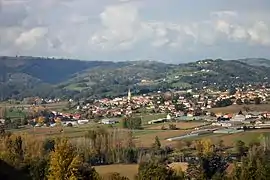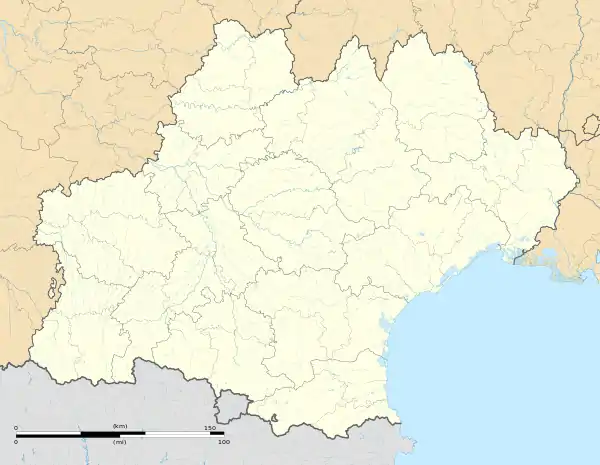Livinhac-le-Haut
Livinhac-le-Haut (from Latin Livinius, name of the Roman general who had a camp in (ac) the area) is a commune in the Aveyron department in southern France.
Livinhac-le-Haut | |
|---|---|
 A general view of Livinhac-le-Haut | |
Location of Livinhac-le-Haut | |
 Livinhac-le-Haut  Livinhac-le-Haut | |
| Coordinates: 44°35′32″N 2°14′06″E | |
| Country | France |
| Region | Occitania |
| Department | Aveyron |
| Arrondissement | Villefranche-de-Rouergue |
| Canton | Lot et Dourdou |
| Government | |
| • Mayor (2020–2026) | Roland Joffre[1] |
| Area 1 | 10.97 km2 (4.24 sq mi) |
| Population | 1,123 |
| • Density | 100/km2 (270/sq mi) |
| Time zone | UTC+01:00 (CET) |
| • Summer (DST) | UTC+02:00 (CEST) |
| INSEE/Postal code | 12130 /12300 |
| Elevation | 169–472 m (554–1,549 ft) (avg. 200 m or 660 ft) |
| 1 French Land Register data, which excludes lakes, ponds, glaciers > 1 km2 (0.386 sq mi or 247 acres) and river estuaries. | |
Population
| Year | Pop. | ±% |
|---|---|---|
| 1962 | 1,410 | — |
| 1968 | 1,423 | +0.9% |
| 1975 | 1,384 | −2.7% |
| 1982 | 1,320 | −4.6% |
| 1990 | 1,179 | −10.7% |
| 1999 | 1,126 | −4.5% |
| 2008 | 1,071 | −4.9% |
Personalities
Livinhac-Le-Haut is the birthplace of several great thinkers and philosophers:
- Pierre Laromiguiere (1756–1837) was amongst other things a member of the Academy of Moral and Political Science.
- Prosper Alfaric (1876–1955) started as a priest then left the church. He taught history of religions at Strasbourg University and was a member of the Union rationaliste.
- Camille Couderc (1860–1933) archivist at la Bibliothèque Nationale, professor of bibliographie ecole des Chartes, president of the Societe des lettres, Science et Art de l'Aveyron.
Sights
Livinhac used to be known as the garden of the Aveyron because of its fertile fields by the beautiful river Lot and was famous for its suspension bridge built at the beginning of the 19th century when the neighbouring town of Decazeville developed as an important industrial town because of its coal mines.
See also
References
- "Répertoire national des élus: les maires". data.gouv.fr, Plateforme ouverte des données publiques françaises (in French). 2 December 2020.
- "Populations légales 2020". The National Institute of Statistics and Economic Studies. 29 December 2022.
Wikimedia Commons has media related to Livinhac-le-Haut.
This article is issued from Wikipedia. The text is licensed under Creative Commons - Attribution - Sharealike. Additional terms may apply for the media files.